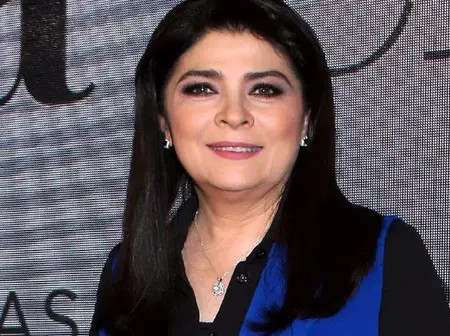Victoria Ruffo, born María Victoria Eugenia Guadalupe Martínez del Río Moreno-Ruffo on May 31, 1962, in Mexico City, Mexico, is a renowned Mexican actress celebrated for her performances in telenovelas.
With a career spanning over four decades, she has become a household name in Latin American entertainment, earning the affectionate title of the “Queen of Telenovelas” due to her emotional depth and versatility in portraying complex characters.
Beyond acting, she has balanced her professional life with family commitments, including her roles as a mother and former First Lady of Hidalgo during her husband Omar Fayad’s tenure as governor.
Victoria shares a close-knit family bond with her two sisters, Gabriela Ruffo and Marcela Ruffo, both of whom have carved paths in the entertainment industry.
Gabriela is a prominent actress and radio host, known for her on-screen collaborations with Victoria, including their joint appearance in the 1985 telenovela Juana Iris alongside Valentín Trujillo.
Marcela, on the other hand, works behind the scenes as a producer, contributing to various projects in the Mexican media landscape.
Ruffo’s journey in the spotlight began in 1980 with supporting roles in the telenovela Conflictos de un Médico, directed by Ernesto Alonso, marking her entry into the competitive world of Mexican television.
She quickly progressed, appearing in Al Rojo Vivo before landing her breakthrough in 1983’s La Fiera, where her portrayal of a fierce, resilient woman solidified her rising star status.
By 1985, she starred in Juana Iris as a blind protagonist, sharing scenes with her sister Gabriela, which showcased her ability to handle emotionally charged narratives.
Her first leading role arrived in 1987 with the eponymous telenovela Victoria, opposite Juan Ferrara, cementing her as a dramatic powerhouse.
The late 1980s and 1990s propelled Ruffo to international fame with Simplemente María in 1989, a rags-to-riches story that became a cultural phenomenon across Latin America.
She continued with Capricho in 1993 alongside Humberto Zurita and Pobre Niña Rica in 1995, demonstrating her range in romantic and social dramas.
After a brief hiatus following her first marriage, Ruffo returned triumphantly in 2003 with Rebeca, followed by the 2005 remake of La Madrastra, which drew massive ratings and revived her career momentum.
In 2007, she headlined the Telemundo production Victoria, a tale of infidelity and rediscovery co-starring Mauricio Ochmann, filmed in Bogotá and aired across the U.S.
The 2010s saw Ruffo embrace mature roles, leading Triunfo del Amor in 2010 as the character Victoria, opposite Maite Perroni and William Levy, in a story blending romance and revenge.
She then starred in Corona de Lágrimas in 2012, portraying a widowed lawyer fighting for justice, and La Malquerida in 2014, exploring themes of forbidden love.
Throughout her career, Ruffo has also ventured into theater with productions like Dulce Pájaro de Juventud and hosted the variety show XE-TU in 1982, while occasionally appearing in films.
Even after focusing on family post-2010, she returned for Las Amazonas in 2016, reaffirming her enduring appeal in telenovelas.
Ruffo received multiple nominations for the prestigious TVyNovela Awards in the 1990s for her leading performances in Victoria, Simplemente María, Capricho, and Vivo por Elena, establishing her as a perennial favorite among critics and fans.
In 2005, her role in La Madrastra earned her another nomination and the Premios Bravo Award for Best Lead Actress, praising her elegant and noble interpretation of a complex matriarch.
Her pinnacle achievement came in 2013 with the TVyNovela Award for Best Lead Actress for Corona de Lágrimas, where her portrayal of a determined mother garnered widespread acclaim and marked her first win in the category after years of nominations.
Additional recognition includes nominations at the Premios People en Español for En Nombre del Amor and Triunfo del Amor, highlighting her crossover appeal in Spanish-language media.

Leave a Reply